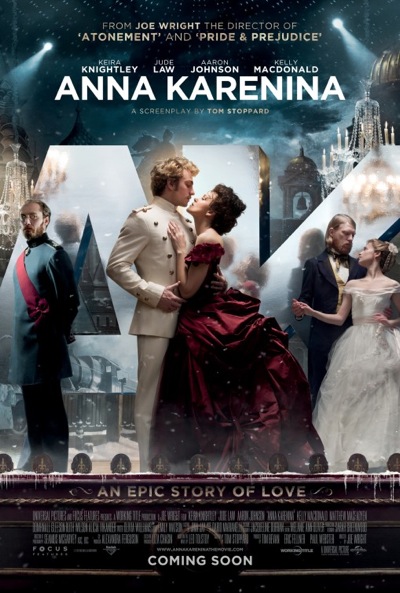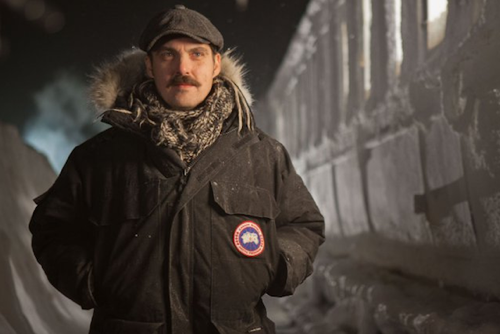
Joe Wright's ANNA KARENINA is a dizzyingly stylized rendition of Leo Tolstoy's oft-adapted classic of love, infidelity and despair. It amplifies the affected manners of the novel's nineteenth-century Russian aristocracy by plunging the characters into a Brechtian world of theatrical artifice, where scene transitions are boldly accompanied by the rising and falling and rotating of sets. It's an ostentatious touch, one that could easily overwhelm the drama, but Wright, working from a screenplay by the great Tom Stoppard, adroitly uses the emphasis on stagecraft to comment on the seemingly stage-bound lives of the characters. These people are acutely aware of their individual roles in society, and they're playing them with tragic gusto.
As with PRIDE AND PREJUDICE and ATONEMENT, Wright seems hellbent on avoiding costume-drama cliches. He's certainly upped the formal ante here, but while his technique is rather insistent in the early going, you gradually grow accustomed to the aesthetic. As Anna's hope withers away, exhilaration gives way to claustrophobia, and the film takes on an almost operatic quality. But Wright - perhaps reined in by Stoppard's precise, unsentimental adaptation - never lets the emotions boil over; the result is an ANNA KARENINA that resonates more strongly the further you get away from it.
When I interviewed Wright last year for HANNA, he was just about ready to make the decision to back away from a more naturalistic approach to Tolstoy's novel. I didn't know it at the time - and, evidently, neither did Stoppard. So when I chatted with Wright last week, I was eager to find out how Stoppard reacted to his decision to go theatrical, and, of course, the finished film. We also talked about Wright's collaborative relationship with Keira Knightley, and whether he has any plans to return to action movies.

Mr. Beaks: So often people complain that costume dramas all look and feel the same. You've shaken this film out of that with your theatrical approach. How did you settle on this approach, and in what sense was it a practical decision versus a creative one?
Joe Wright: I guess it's really a creative decision that was allowed to happen because of practical concerns. This story, what it's about and what it says was so important to me, but I feel sometimes people approach costume dramas with certain preconceived ideas, and they're often correct in those ideas. It's all about the surface and the historical reenactment, and that somehow distances the audience from a kind of emotional relevance. So I was trying to think of ways to make a costume drama - and, in particular, this novel - more vital and vibrant for a modern audience. I'd been thinking of ways to do this. I had a beautiful, beautiful script from Tom Stoppard, which was told in a naturalistic form. And I was thinking about a stylization of performance, which I was thinking of putting into naturalistic locations. And then the budgetary constraints became quite apparent. A lot of the budget was being spent on travel and location fees and hotels, and it was all very frustrating because it took the money away from the screen. So at a point quite close to shooting, I almost accepted the fact that now was the time to do what I'd been talking about doing for some time.
Beaks: What did Stoppard think when you approached him with this idea?
Wright: He, um, listened carefully. (Beaks laughs) He was very gracious not to give the knee-jerk reaction of "How dare you!?!?" He listened, and he understood it. What I did isn't very new in terms of theater. It's perhaps new or novel in film, but it's something that is done in theater all of the time. For example, one can take RICHARD III and set it in the Weimar Republic. So he listened, and when I got to the bit where I was explaining and showing him storyboards of Vronsky's horse tumbling from the stage, that was the point when he said, "Okay, I want to see that." He became very excited about that.
Beaks: What was his reaction when you showed him the finished movie? Were you at all nervous?
Wright: You know, Tom was a great hero of mine before I met him, and he became even more so after working with him, so I wanted his approval certainly. I think one would've been crazy not to. But I felt confident that we'd served the emotional story well, and I was very relieved. He kind of crept over to me in the screening room after the first twenty minutes, leaned over to me and said, "This is mind-boggling." And I went, "Is that good or bad?" And he said, "Mind-bogglingly wonderful." I was relieved.
Beaks: How much rehearsal was required to pull off the various long takes and seemingly complex scene changes in the film?
Wright: There was no tech run as they'd have in the theater. What we had was my usual three-week rehearsal with the actors, and then they did a lot more rehearsal in terms of the dance work. A lot of those three weeks were about experiments in physical performance, and working with choreographer Sidi Larbi Cherkaoui. But in terms of how the sets moved and all that stuff, it was meticulously planned. The actual main set, the theater set, was in operation twenty-four hours a day for three months. When we weren't shooting in there, the sets were being changed for the next day or the next sequence. It was planned carefully, and then left to the will of the gods.
Beaks: You have a real gift for shooting Keira Knightley. There's a certain chemistry between you two. Obviously, she is a stunningly beautiful woman, but what is it about her that makes her such a natural for you to work with? What do you two have in common?
Wright: I think we share quite a lot in common really. We're both dyslexic, and I think what that has created in us is that we both work best when we feel like we're the underdogs, when we feel like we've got to work really hard. We have an understanding and trust in each other's hard work, and an understanding that that hasn't always been easy. And we talk to each other. We're very, very honest with each other. I've known her since she was seventeen, and she's seen me from my first film to now my fifth. We approach each other very openly and honestly, and we really just talk to each other. We can now share things, and say, "Oh, this character's a bit like so-and-so who we knew five years ago." I think I direct from quite an emotional place, and I'm not afraid to show my emotions. And Keira's not afraid to show me her strengths, her bite.
Beaks: Last time out, you got to let loose with making an action film in HANNA. Now that you've done this invigorating type of costume drama, I'm wondering if you'd like to return to straight-up action.
Wright: I do. I really enjoyed making HANNA, and I learned a lot making that film, so I'd like to put some of those lessons into practice. I feel like action is pure cinema; it can't happen in any other art form.
Beaks: Do you think you'd do something like that next?
Wright: Maybe. I'm figuring out what to do next at the moment. One option is the live-action adaptation of THE LITTLE MERMAID that I've been talking about for a while. That would involve a bit of action. I'm kind of figuring stuff out, but I want to slow down a little bit. I've made five films over eight years, and I think I might need to slow down.
Joe Wright's ANNA KARENINA hits theaters this Friday, November 16th. Don't miss it.
Faithfully submitted,
